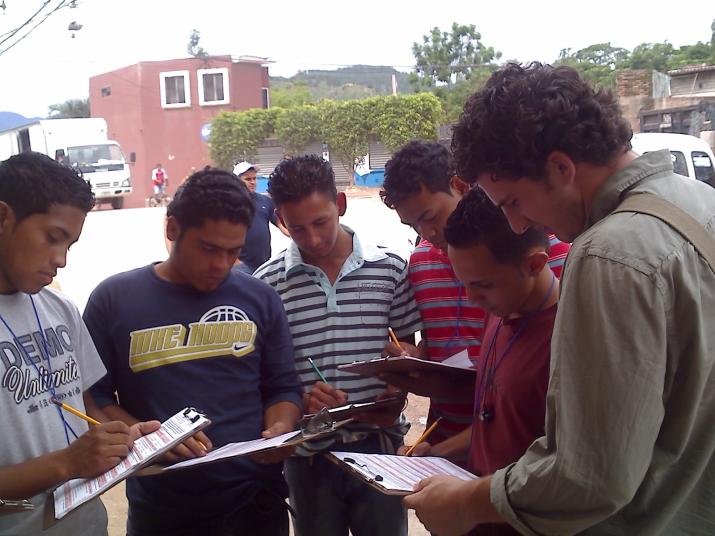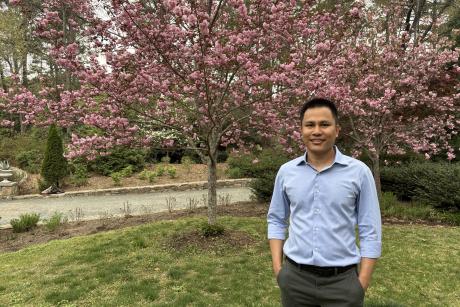
Catalino's research spans eight locations across the capital city of Tegucigalpa.
Published July 6, 2010, last updated on March 21, 2013 under Education News
The faith of a community can play a critical role in how people seek treatment for illness and disease. Michael Catalino, a 23-year-old graduate student in DGHI’s Master of Science in Global Health (MSc-GH) program and player on Duke’s National Championship Lacrosse team, is spending the summer in Tegucigalpa, Honduras where he is studying the intersection between religion and health. From this experience, he is also learning about holistic medicine and what it means to have a servant’s heart and keep life in perspective.
As part of his MSc-GH research project, Catalino is identifying the cultural and personal worldviews of Hondurans and using survey data on health to correlate certain worldviews with health seeking behavior. Christianity is prevalent in the Honduran community, and some data suggests people are more likely to use prayer as a substitute for medical treatment.
“Once I spent some time in Honduras this spring and talked with my in-country mentor,” said Catalino, “I concluded the best approach to reaching the communities and making a real change in the future is through the religious culture.”
After a week of training a team of 11 surveyors helped Catalino carry out his survey, traveling door-to-door in eight locations within the capital city of Tegucigalpa to survey more than 500 people. “I underestimated how important it is to have well-trained surveyors, but we have an excellent team working with us,” said Catalino. “They know the locations well, learn quickly, work diligently and have been so polite in recruiting subjects. Also, my Spanish is getting much better and I can do surveys myself, which is unbelievable.”
Catalino learned the Honduran community is very open to discussing their views on faith and health. Interestingly, he found that people do not necessarily associate methods of treatment with the perceived origin of illness.
“Someone may say, for example, that germs and other biological organisms do not cause disease, but physicians are very important in curing disease,” said Catalino. “Along those same lines, someone may say that punishment from God for sin has no influence on causing illness, but faith and prayer are a sure way to cure illness. But, it is amazing how diverse the responses have been.”
While few complementary and alternative medicine (CAM) studies include prayer as a potential treatment, Catalino’s research accounts for prayer to God and Saints, in combination with herbal medicines. Preliminary survey data shows a higher rate of CAM use than anticipated in this Honduran community. Catalino hopes his research will help physicians better understand effective and culturally-appropriate strategies for treating their patients.
“Getting medicine to people who need it is the obvious problem, and there are many researchers working on that aspect of the Millennium Development Goals,” said Catalino, “but I am interested in how to provide culturally competent health care services that are well-received by the patients because they are personal and within their own worldview, which will hopefully increase compliance. This could be along the lines of a patient explanatory model, or taking a spiritual history, even call it holistic, cura personalis medicine.”
Catalino said his research project has shown him the kindness of the Honduran community, many of whom have opened their home to him and were open to participating in the survey. The experience has also given him a deeper understanding of how to serve a population while being responsive to cultural sensitivities.
“In order to serve a culture competently, you need to know that culture well,” said Catalino, who in addition to the MSc-GH program, plans to attend medical school. “I know I will return to the global health field once I become a physician, and this experience has made one thing very clear: I need to choose one group of people I want to serve, learn about their culture, and how best to serve them.”
In addition to research, Catalino is working with Jericho Ministries on the weekends to help care for orphaned children. In the past, he has also volunteered at a South African hospital and Vietnamese elementary school.
“Do you wonder why more people do not dream of working in the developing world? I bet it has something to do with people who don’t want to work outside of their comfort zone,” said Catalino. “I, on the other hand, thrive outside of my comfort zone.”
Read Catalino’s blog on "Diaries from the Field."
This story was written based on Catalino’s preliminary observations while working in the field. A scientific analysis of his research project followed.
Data suggests religious Hondurans are more likely to use prayer as a substitute for medical treatment.


